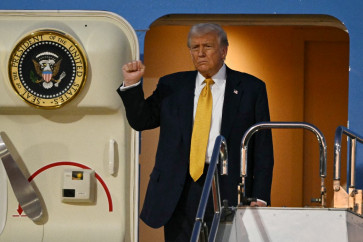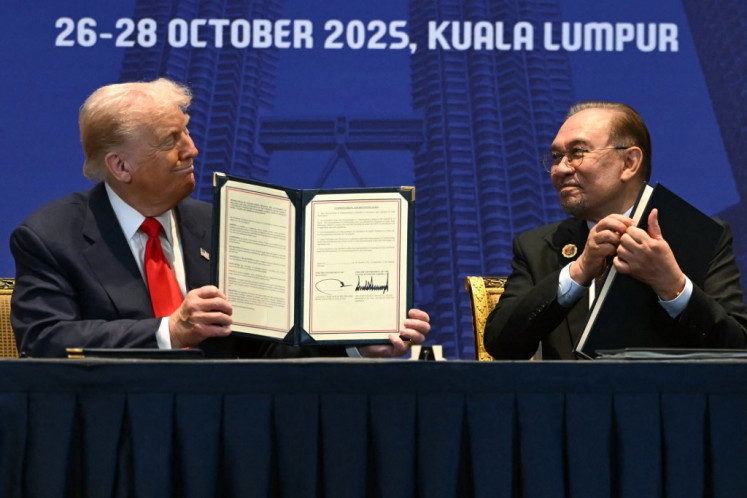Popular Reads
Top Results
Can't find what you're looking for?
View all search resultsPopular Reads
Top Results
Can't find what you're looking for?
View all search resultsAfter recent portfolio sell-offs, is traditional retail banking dead in Indonesia?
Multinational banks are looking for “smarter” ways to serve Indonesia’s fast-growing consumer loan sector without high costs and risks, even as more and more local lenders join the digital banking bandwagon.
Change text size
Gift Premium Articles
to Anyone
A
mid fiercer competition in Indonesia’s retail banking sector, global lenders have been changing their strategy, including by selling retail portfolios, finding new customers through tech platforms and channeling funds through peer-to-peer (P2P) apps and multifinance firms.
Analysts believe the role of conventional retail banks will shrink as their products are increasingly replaced by new ones that leverage novel technologies.
However, some customer segments that value human interaction will still need traditional banking solutions.
In January 2022, Citi announced it would be selling its retail banking and credit card business in Indonesia and other Southeast Asian countries to Singaporean lender UOB for US$3.6 billion.
In April 2023 another global bank, Standard Chartered, disclosed a plan to sell its retail loan portfolio in Indonesia to Bank Danamon, a local subsidiary of Japanese banking giant MUFG Bank, in a transaction that would include transferring Standard Chartered's conventional credit card, personal loan, mortgage and auto loan portfolios.
However, neither bank is kissing goodbye to the country's retail banking sector.
Citi disbursed Rp 275 billion ($18.2 million) in ESG (environmental, social and governance) funds to multifinance firm Home Credit in December last year. Meanwhile, Standard Chartered channels loans through fintech companies Kredit Pintar and Kredivo.
Those moves point in the same direction as MUFG’s recent decision to acquire another Indonesian multifinance firm, Mandala Finance, adding to the bank’s existing consumer loan portfolios of Adira Finance and Home Credit.
All are aimed at reaching Indonesian consumers without an extensive local presence.
Standard Chartered is even pursuing individual customers through partnerships with local e-commerce players Bukalapak and Sociolla.
"We have a white labeling service called Nexus that allows users of Bukalapak to open digital accounts through the BukaTabungan feature," Diana Mudadalam, Standard Chartered head of corporate affairs for Indonesia and ASEAN, told a press briefing on June 15.
Beginning with this option to open individual accounts through its partner’s app, the service would be scaled up later to include lending, Diana said.
The bank is still working to launch a similar product with Sociolla to target the beauty and cosmetics platform’s predominantly female users.
Standard Chartered group chairman José Viñals explained that selling off the lender’s Indonesian retail banking portfolio, rather than exiting the local sector, was merely transitioning to a "different way of doing business".
"Providing consumer lending this way is much more convenient, more efficient, but we can scale the business in a more significant way than before," Viñals told the same press briefing.
The bank had pursued a similar strategy for a few years with Ant Financial in China and had succeeded in increasing its portfolio with a lower nonperforming loan (NPL) ratio than in traditional banking, he added.
Viñals nodded when asked whether traditional retail banking was dead.
Read also: Standard Chartered Indonesia to sell retail loan portfolio to Bank Danamon
M. Amin Nurdin, a senior faculty member at the Indonesian Banking Development Institute (LPPI), characterized the changes Standard Chartered had made as "a pretty smart strategy" that would allow the bank to share its risk burden with other financial firms.
"They want to get the profit but in an optimal and efficient way of working, and with the lowest risk. They are establishing a new business model that can keep them afloat," Amin told The Jakarta Post on Tuesday.
Banking industry analyst Doddy Ariefianto from Binus University said international banks’ decisions to sell their retail portfolios were based on the pandemic’s toll on the banking market. The global health emergency had pushed banks to rethink their future in Indonesia, especially among banks that had started with a universal or one-for-all approach.
"But the situation could change. It could be reviewed again," Doddy told the Post on Tuesday.
Future of brick-and-mortar banks
Doddy opined that a physical branch was simply a means of delivery in the banking industry. Amid technological advancements, banks would maintain their essence as financial institutions while shifting to other methods, such as automatic teller machines (ATMs) as well as digital and mobile banking.
Sooner or later, local banks would also go down that path as people started to value their time more and became reluctant to visit physical branches, he said.
But brick-and-mortar banks would continue to exist in Indonesia for now, Doddy said, given the local culture that still valued human interaction.
"Some countries that can fully embrace digital banking are China and Singapore, where people might not have a problem with dealing with robots. There is a cultural issue here," he said.
Read also: Major RI banks see cost of funds hike amid high interest rate environment
Standard Chartered's Viñals also admitted that the lender took different approaches in the countries where it operated. For example, it had developed full-fledged digital banks in Hong Kong and Singapore.
"We are very agile. We adapt the way we do business in different markets to the needs of the people," Viñals said.
According to LPPI's Amin, there was an obvious shift from the physical to the digital realm in retail banking, which reduced the market share of brick-and-mortar banks. He predicted a future without the early devices of electronic banking, such as ATMs and card readers, as more banking services were delivered through smartphones.
No bank could stay on the sidelines of this trend, Amin said: "Even small regional banks are thinking that way. Their owners are open-minded about collaborating through mergers and acquisitions to strengthen their capital.”










